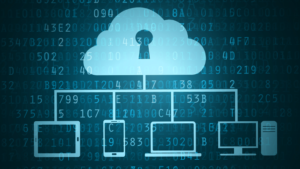Cloud ransomware, often called “ransomcloud,” is the next evolution of ransomware designed to target the once secure cloud. As ransomware becomes big business and an even bigger problem, cybercriminals are looking for new avenues to attack. As more organizations move their data to the cloud, hackers are moving along with them and disrupting cloud security.
As so many of us conduct vital business communications through email and store sensitive documents in the cloud, it’s more important than ever to safeguard yourself and your organization from ransomcloud.

Email is no longer safe from ransomware
In the past, ransomware did not have access to email, whereas now hackers are starting to target email, making ransomcloud especially detrimental. A successful attack could mean lost access to email, intellectual information, business correspondences, sales leads, contracts, documents stored in email, etc.
According to the FBI, 90% of all malware is delivered through email, and phishing is the primary vector of transmission for most types of ransomware, including ransomcloud. Falling victim to an attack could be as easy as accidentally clicking on a malicious link in an email. Once clicked, a ransomcloud infection starts encrypting all messages and attachments in your mailbox and has the potential to encrypt all data on your hard drive and cloud drives.
The best way to preserve your email and cloud data is to use layered security, starting with dedicated email security and a robust backup solution. Email security can help block phishing emails and filter out potentially dangerous links. A good email backup solution will replicate your entire email account (including messages and attachments) and store them in a secure location away from the reach of a ransomcloud attack. This will allow you to restore your data if an attack is successful.
Cloud drives are vulnerable to ransomware
Ninety-four percent of enterprises currently use a cloud storage service, and this number will only get larger. So, it’s no wonder why hackers are setting their sites on cloud drives.
The most common way cybercriminals currently target cloud storage is by using the automatic file sync process. Most organizations utilize a synchronization process to keep files in sync locally and in the cloud. When a file is changed, it signals the synchronization action to start. Ransomcloud takes advantage of this process. If a single user is infected with ransomware, they can inadvertently synchronize the encrypted file(s) to cloud storage and share them with the entire organization.
“If an organization uses cloud services for data storage or back-ups and… if the data is synced to the cloud storage, the files are just as susceptible to encryption as if they did not use the cloud at all,” explains Erich Kron, security awareness advocate at Knowb4.
In addition to the individual, cloud providers are also being targeted because cybercriminals know that a successful attack on a provider’s infrastructure could mean encrypting vast amounts of their customers’ data with a single infection.
Recently, a US cloud-based storage provider for dentist practices was infected with a ransomware strain. According to CNN, an estimated 400 dentists’ offices were unable to access patient records or financial ledgers following the attack.
There is a false notion that the customer and the cloud service provider equally share responsibility for data protection. The service provider is responsible for protecting their systems and ensuring a customer’s cloud data can’t be accessed without proper login credentials. But that’s about as far as their responsibility to protect your data goes. It’s ultimately up to the end-user to ensure their data is secure.
This often means using a third-party solution to make sure information stored in the cloud is safely backed up and recoverable in the event of a ransomcloud attack.
How to stay safe from ransomcloud attacks
As hackers become more advanced, cybersecurity must evolve to stay ahead of threats. This means using multiple layers of security, including email security, web security, antivirus, endpoint security, firewall, data backup, data recovery, and much more. In the modern cybersecurity landscape, it’s not enough to have security solutions in place; they require professional attention and management to be effective. Effective cybersecurity must be properly set up and maintained and requires a well-trained person or team to respond if an event like ransomcloud occurs.
The best defense against ransomware and ransomcloud is a qualified team of IT professionals working to keep you safe. An IT team from tca SynerTech will suggest the best solutions for your organization and manage those tools to keep you as safe as possible. If the worst happens and an attack is successful, it’s essential to know who to turn to for help. Contact tca SynerTech today to learn how our IT team can help your organization stay safe from cyberthreats like ransomcloud.




